TECHNOLOGY TRANSFER AND KNOWLEDGE EXCHANGE
IMPACTING BEYOND
ACADEMIA



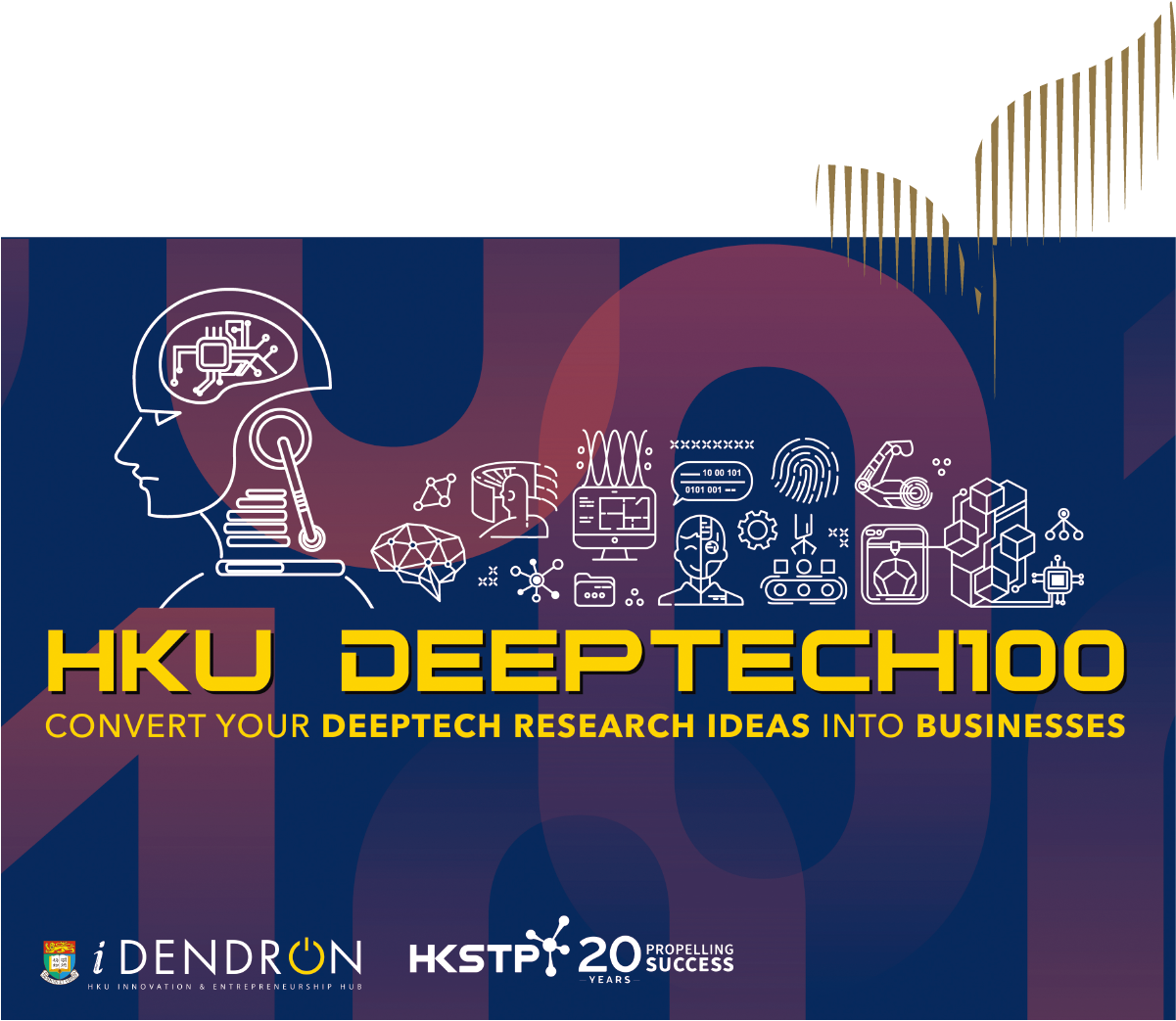
HKU DeepTech100 is a one year co-ideation programme aiming for translating deep tech research outcome from top universities into future businesses.
To deepen the impact of our research, the HKU Techno-Entrepreneurship Core (HKU TEC) was launched in autumn 2022 to coordinate innovation and entrepreneurship activities across campus, promote interdisciplinary collaboration, connect with stakeholders and external partners, and train students and incubate start-ups. Already we have arranged for iDendron to come under the HKU TEC umbrella, which will report directly to the Vice-President and Pro-Vice-Chancellor (Research).
iDendron was launched in 2017 and in the 2021–22 academic year provided coaching, mentorship, legal and funding support to 45 new start-ups by HKU students, researchers and alumni, bringing the total to 180 since it opened in 2017; it also prepared to launch an incubation programme on deep tech projects in early 2023.
The new Tam Wing Fan Innovation Wing, run by the Faculty of Engineering, is also fostering innovation by students and researchers. Innovation Wing One opened in December 2020 with a focus on interdisciplinary innovations by undergraduate students and teachers, while Innovation Wing Two opened in December 2021 for researchers to collaborate across disciplines to tackle grand challenges facing society.
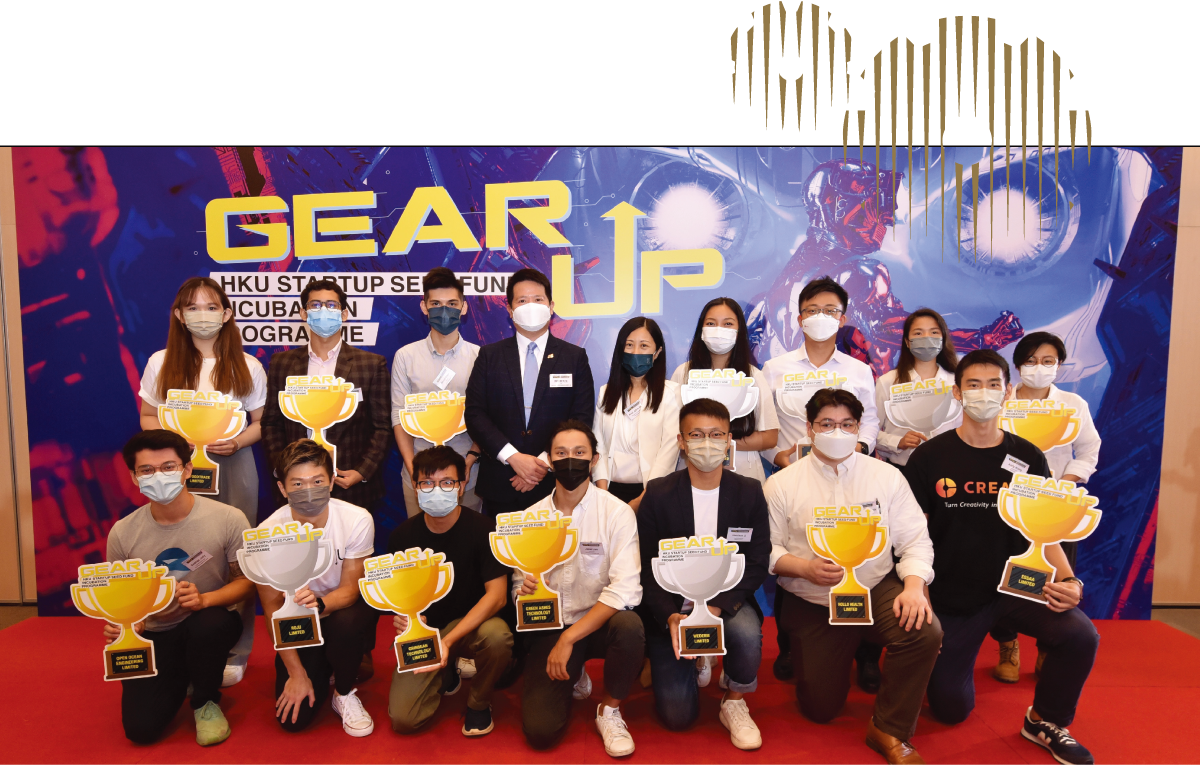
The Gear Up Startup Seed Fund & Incubation Programme aims to provide entrepreneurial support and incubation services that befit the needs of young people who are about to start their businesses, helping them turn ideas into reality.
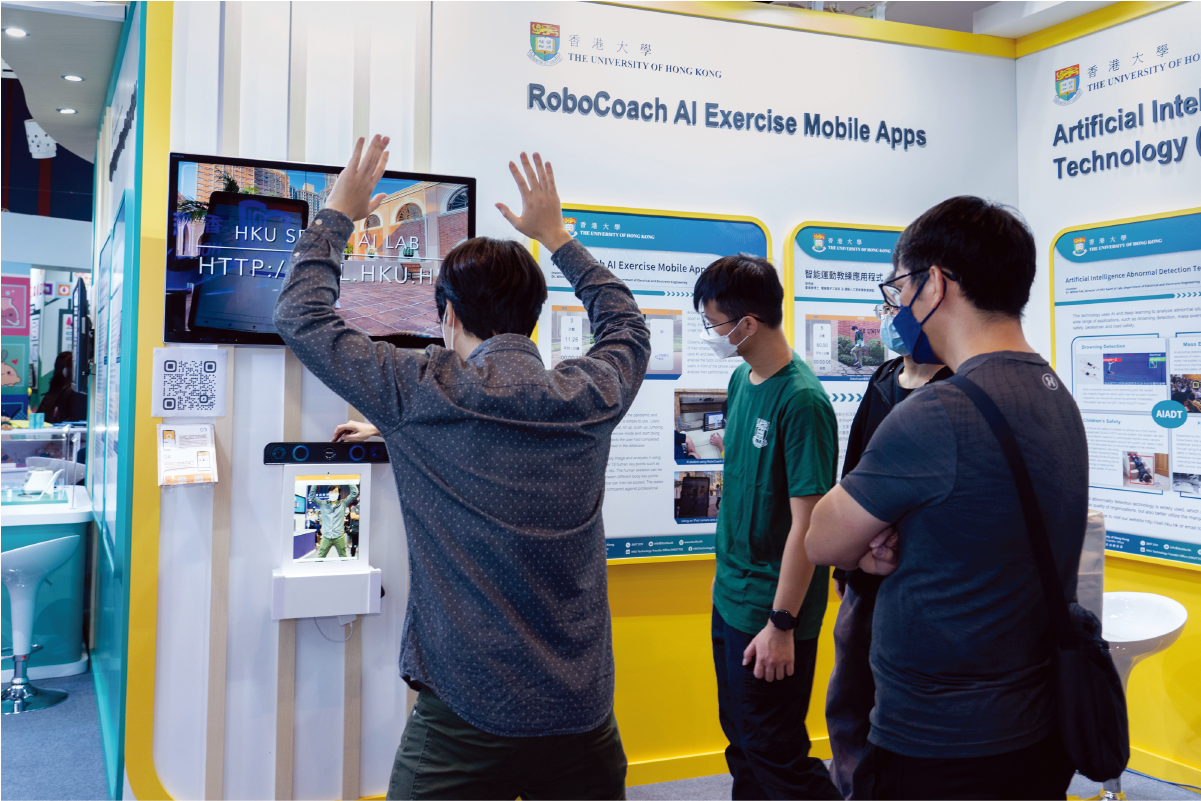
Cutting-edge HKU innovations were showcased in the InnoCarnival 2022 organised by the Innovation and Technology Commission of the Hong Kong government in October 2022.
The infrastructure to support innovation comes as the University’s research is attracting growing interest from industry, particularly in the Greater Bay Area. For example, we have embarked on 11 collaborative projects with different business units of Huawei and we signed a Memorandum of Understanding with the Huawei Research Centre (HK) in November 2021 to explore deeper, closer partnership. We have also signed license or collaboration agreements with several companies to develop COVID-19 vaccines based on our research, including Wantai BioPharm, Immuno Cure Biotech Ltd in Hong Kong and China National Biotec Group (Sinopharm) (see Industrial Impact).
The University offers several funding awards for start-ups initiated by HKU students and staff. The TSSSU@HKU Awards support about 20 teams each year and in 2022 allocated HK$1 million Grand Awards to each of four start-up teams and up to HK$500,000 in Seed Fund Awards to each of 16 teams. The SEED Programme, a six-month collaboration with the Hong Kong Science and Technology Parks Corporation, offers up to HK$100,000 to early-stage start-ups and in 2022 supported 20 teams. Fourteen HKU teams also benefitted from the Gear Up Startup Seed Fund & Incubation Programme organised by the Youth Development Commission, receiving up to HK$600,000 each plus mentorship, legal and professional support.
In 2022, we announced a new Strategic Impact funding scheme that provides a maximum of HK$500,000 each to projects at HKU that have impact in areas of national and global importance. Seven themes have been identified: green and sustainable energy; health and medical technologies; industry 4.0; smart cities; food security and nutrition; use of IT in education; and community engagement for governance and law. The separate Impact Projects scheme also continues to fund projects regardless of whether they fall under these themes, offering a maximum of HK$150,000 per project; 45 projects were supported in 2022.
The impact of our efforts and investments is gathering momentum. We are filing more patents and winning more awards for our inventions – for instance, HKU received a record 12 medals at the International Exhibition of Inventions of Geneva in 2022, including four golds. Participants in our internal Knowledge Exchange Awards are also demonstrating deeper impact by using their research to improve conditions in society. Looking ahead, we will be leaning into impact by reviewing our strategies to further enhance and strengthen technology transfer and knowledge exchange, striving to echo the national development goal of fostering collaboration with institutions in the Mainland and elsewhere, and contributing to the development of the Greater Bay Area as a world-class hub of innovation and technology.




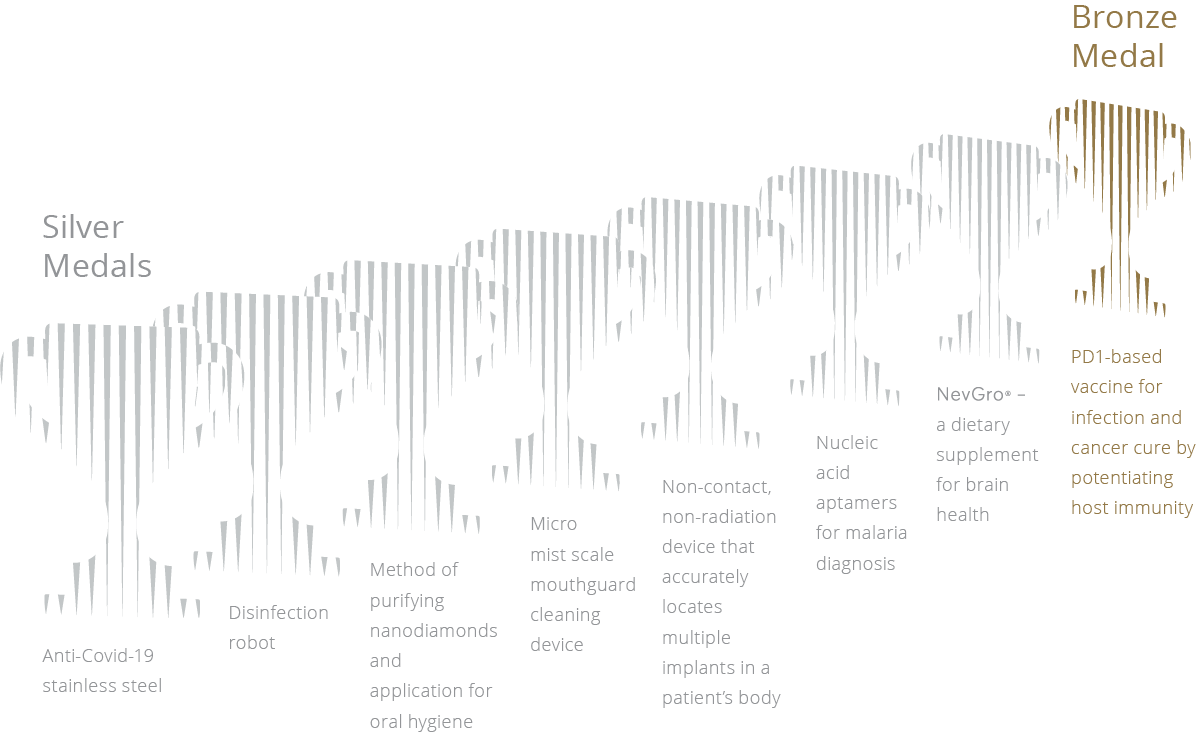
The Tam Wing Fan Innovation Wing One opened in December 2020 as a hub for innovation, exploration, outreach and collaboration, managed by the Faculty of Engineering. Occupying more than 2,400 square metres, it is a makerspace equipped with state-of-the-art facilities for supporting undergraduate students’ hands-on and experiential learning activities. As of autumn 2022, more than 2,300 students had completed induction and training programmes there. Students are already producing tangible outcomes. A student team from Innovation Wing One won the University Pitch Competition in Hong Kong on Global Grand Challenges in May 2022 for creating a digital sewage monitoring system to detect viruses that is small, cheap, scalable and can provide results in real time; they will be one of five teams representing China in the International Student Competition of the 5th Global Grand Challenges Summit. Innovation Wing also houses the Innovation Academy which connects innovators, runs activities such as workshops and pitching contests, offers funding schemes for student projects, and provides the platform InnoHub to connect students and staff from 10 faculties to collaborate on cross- disciplinary projects.
Innovation Wing Two opened in December 2021 as an enabling platform for engineering researchers to collaborate with other researchers and professionals from various disciplines to tackle grand challenges and produce outputs that have significant impact in Hong Kong and global communities. The TechTalk series of forums and dialogues features researchers and postgraduate students sharing their research findings and insights on innovation-related topics. HKU innovations have also been presented through two exhibitions at Innovation Wing Two, one on Engineering for Better Living and the other on Digitalisation.
Activities are expected to accelerate in the coming years with the growing encouragement of innovation at HKU as a whole. The Innovation Wing was made possible through a generous donation from Mr and Mrs Tam Wing Fan, who gifted HK$140 million to develop the facility and set up a fund to support the Innovation Academy.
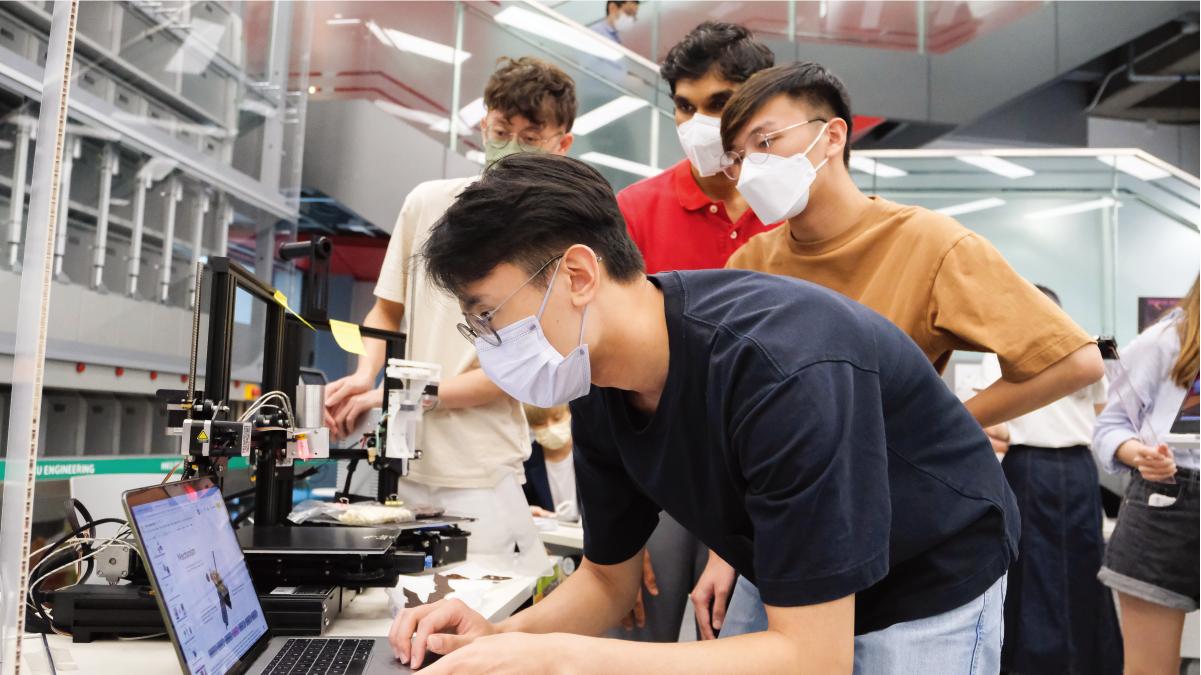
The Inno Show offers a platform for students to create and showcase their own work outside classroom.
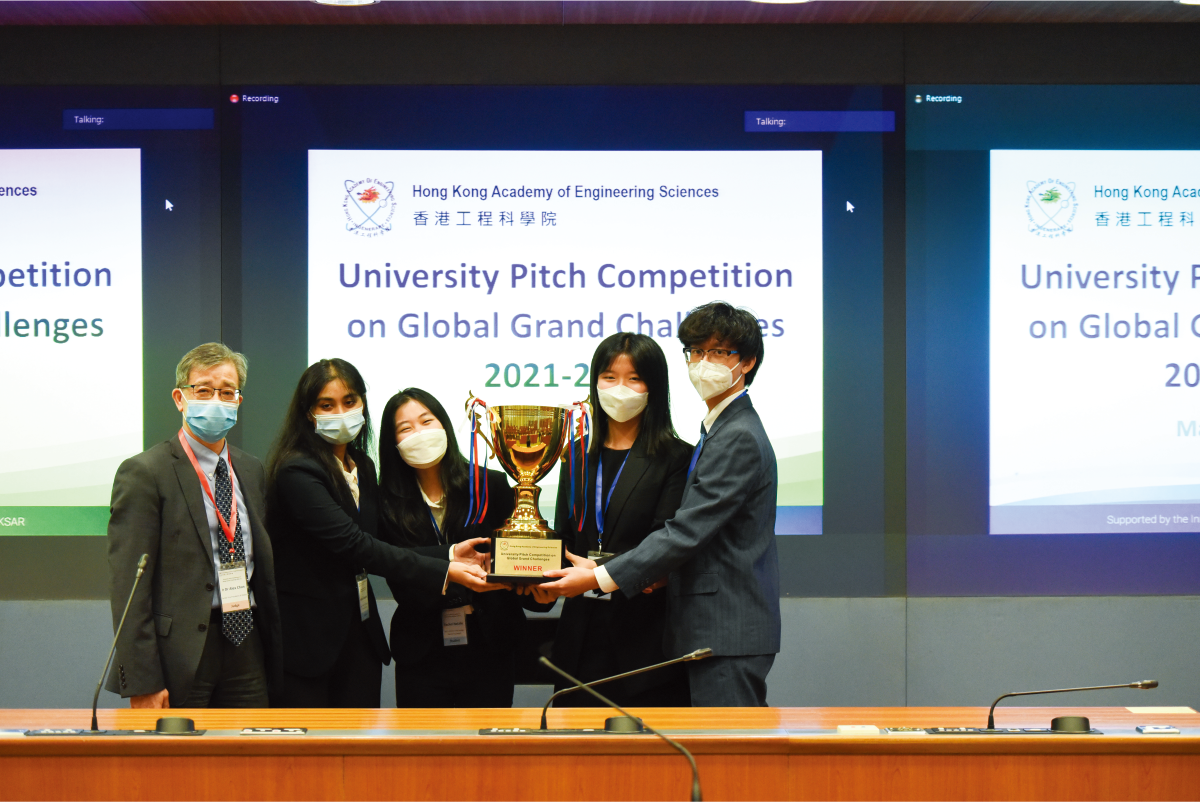
The HKU team won the University Pitch Competition on Global Grand Challenges 2021–22 with their project ‘PERfECT Viral Sewage Monitoring System’.
Professor Zhang Tong, Chair Professor of Environmental Engineering in the Department of Civil Engineering, is an expert in extracting information from sewage that has proven to be beneficial not only to the environment but also human health.
He has studied the environmental microbiome and wastewater-based epidemiology for more than 15 years and he and his team have invented quantitative assays to detect microorganisms that can improve pollution control in wastewater treatment facilities. They have also developed comprehensive analytical methods for detecting emerging antibiotic-resistant genes in the environment, which is a silent pandemic worldwide.
More recently, Professor Zhang used his expertise to design effective sewage surveillance systems that track the transmission of the COVID-19 virus and its variants in the community and reveal hidden cases. The systems were subsequently integrated into the Hong Kong government’s pandemic- control programme.
For his achievements, Professor Zhang was awarded the HKU Innovator Award for 2021.
“Understanding the microbial community is necessary if we want to design reactors with better performance and if we want to control the spread of pathogens in animals and the environment that may eventually infect humans,” he said.
His most recent research has been looking at how to weaponise phages – viruses that infect bacteria – to help remove pollutants in wastewater. The findings were published in 2021 in Nature Communications.
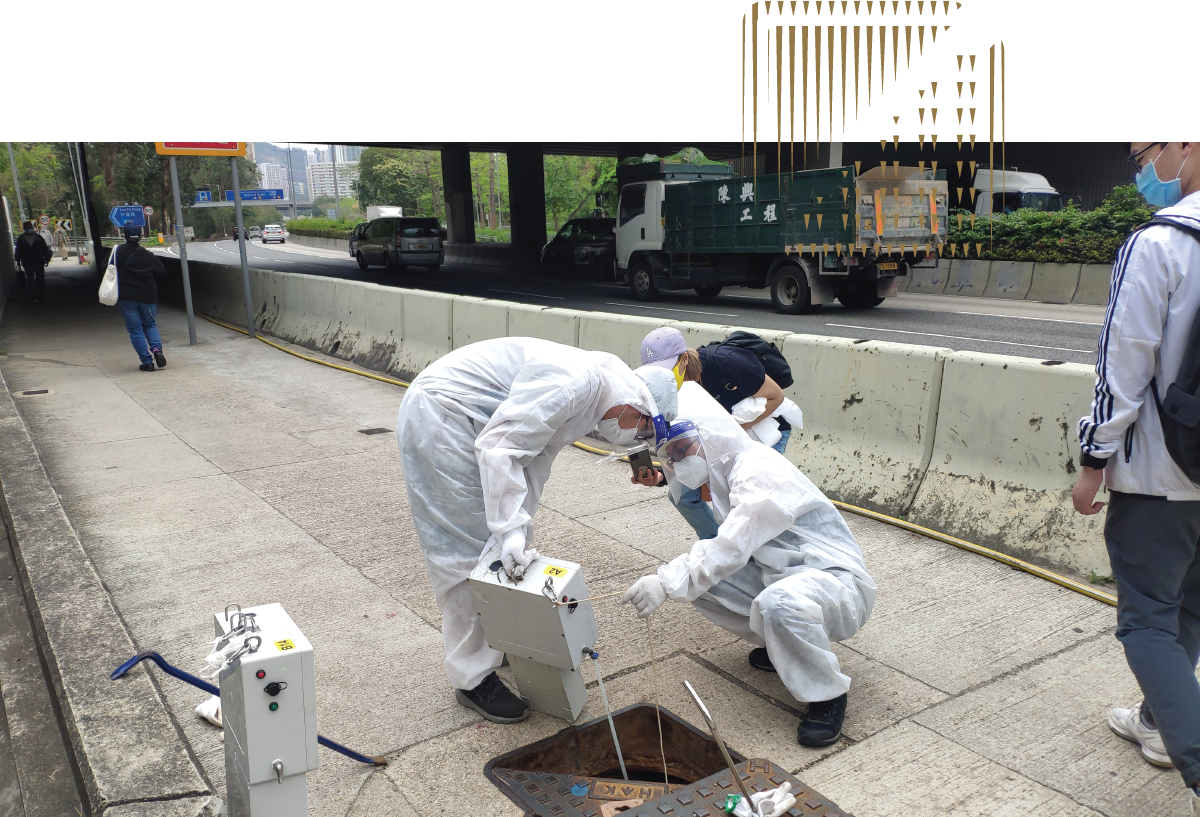
The sewage surveillance technology developed by the multidisciplinary team of Civil Engineering and Public Health has been incorporated into the whole control strategy against COVID-19 since December 2020.
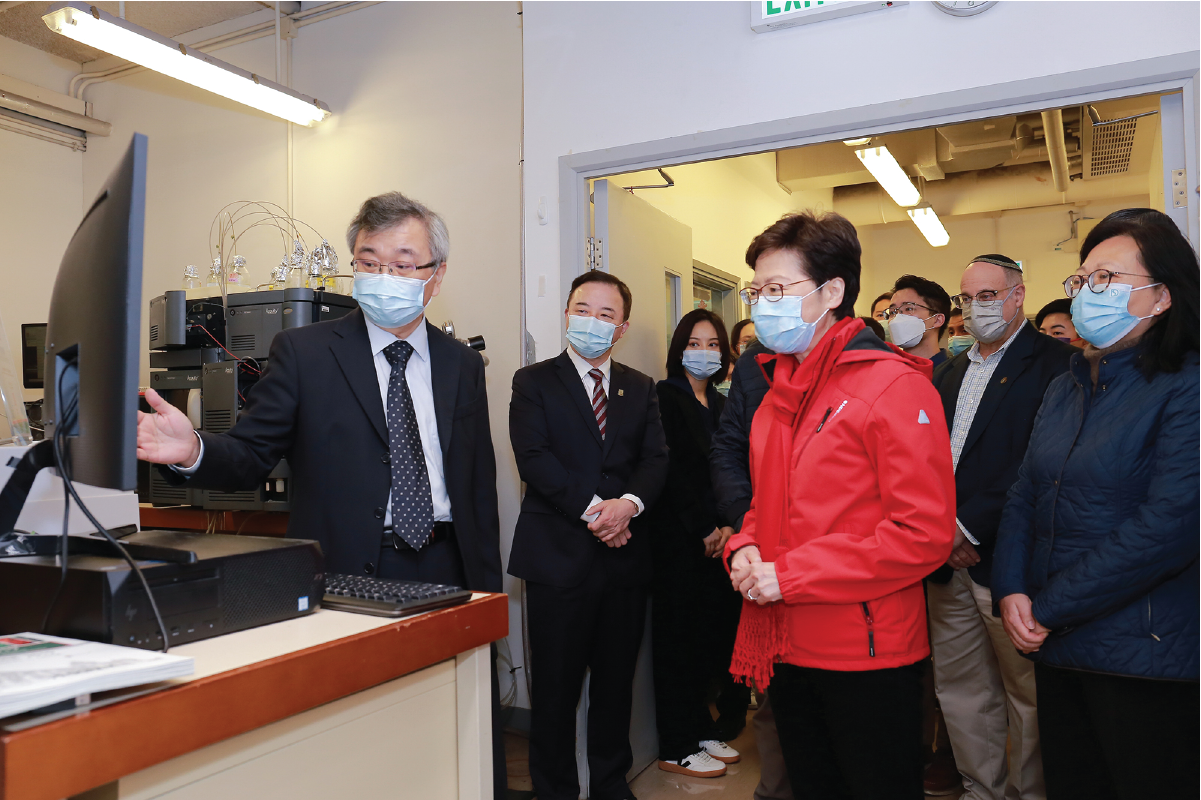
Professor Zhang explaining to the then Chief Executive Mrs Carrie Lam on the work of the Environmental Microbiome Engineering and Biotechnology Laboratory during her visit to HKU’s sewage monitoring facilities in February 2022.
HKU scientists have developed three different COVID-19 vaccine candidates that each offers unique benefits and have all proceeded to the clinical trial stage. In all cases, they are drawing on HKUMed’s long-standing expertise as a global leader in emerging infectious diseases and working closely with industry partners.
Professor Chen Honglin and Professor Yuen Kwok Yung, Henry Fok Professor in Infectious Diseases, have developed a nasal spray vaccine based on their previously established flu-based DelNS1 Live Attenuated influenza virus platform. This has strong potential as a booster vaccine for people who previously received SARS-CoV-2 vaccines, particularly as it is cheap and easy to deploy; it could also be developed into a dual vaccine against both flu and COVID-19. HKU has collaborated on the vaccine with Xiamen University and Wantai BioPharm, a Chinese pharmaceutical company. A Phase 3 clinical trial has been completed and Wantai has applied for emergency use approval of this flu-based intranasal spray COVID-19 vaccine.
Professor Chen Zhiwei has developed an injectable COVID-19 DNA vaccine based on a DNA vaccine platform he developed for an AIDS vaccine. The latter has been going through the conventional vaccine testing and approval process for several years, so it was simply a matter of swapping the HIV gene for the COVID-19 virus. The vaccine offers strong protection while being cheap and easy to manufacture, and it is undergoing a Phase 1 trial in partnership with Immuno Cure Biotech Ltd in Hong Kong.
Professor Ivan Hung, Ru Chien & Helen Lieh Professor in Health Sciences Pedagogy, of the Department of Medicine has led the development of an inactivated COVID-19 vaccine targeting the Omicron variant as a next- generation vaccine and booster. HKU’s Department of Microbiology was the first research team in Asia to isolate the variant and shared it with other research institutions and vaccine manufacturers. China National Biotec Group (Sinopharm) subsequently decided to initiate a clinical trial in Hong Kong through the HKU Clinical Trials Centre. The trial began in early summer involving about 1,800 adult volunteers who had already received two or three doses of inactivated or mRNA COVID-19 vaccines.
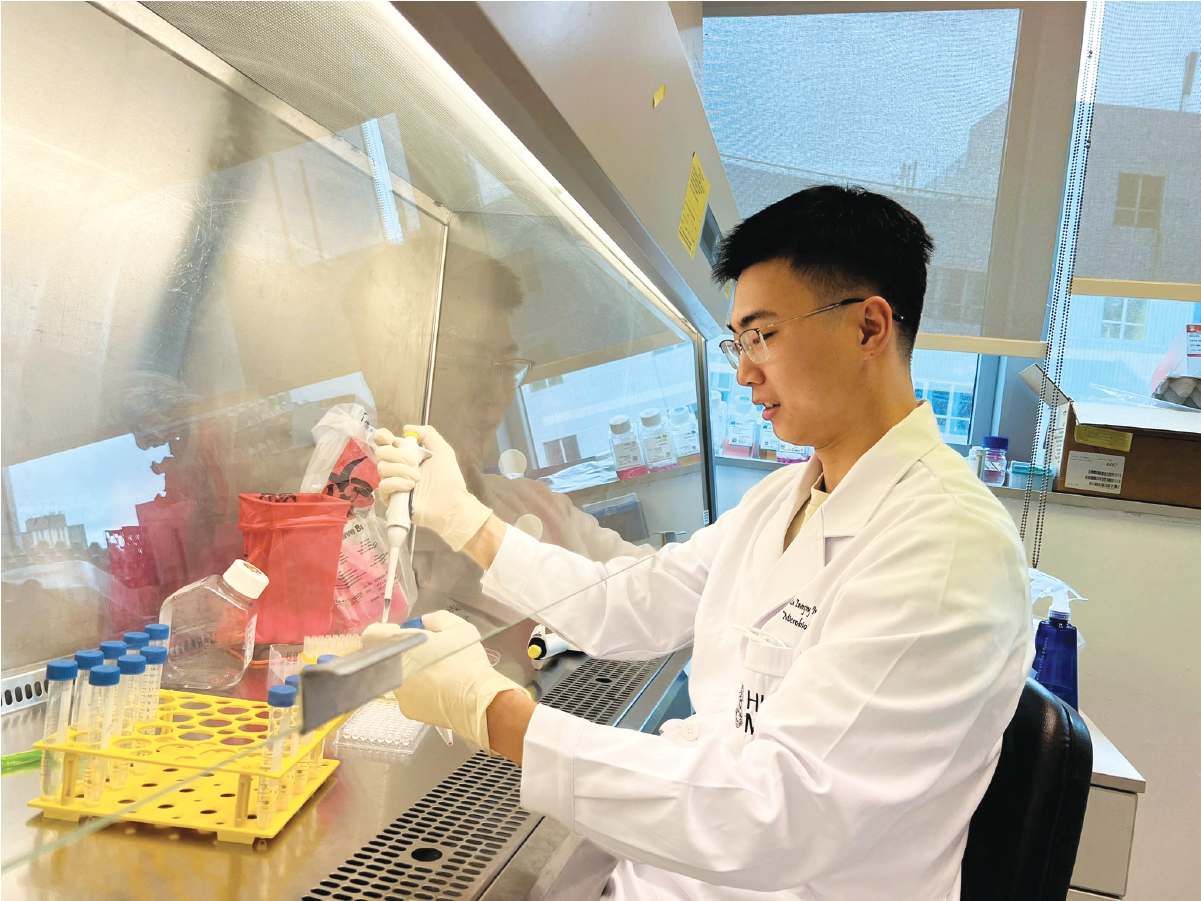
The three different COVID-19 vaccine candidates developed by HKU scientists have proceeded to clinical trials.
ArchiREEF, a new start-up founded by Dr David Baker and PhD candidate Vriko Yu in the School of Biological Sciences, is combining marine biology with the latest 3D printing technologies to provide a one-step solution for bringing back corals and restoring degraded marine ecosystems.
The company has developed the world’s first artificial reef structure that is 3D printed using terracotta, making it ocean-friendly, scalable and adaptive to any coral species, landscapes and ecosystems. The structure also has biomimicry elements to enhance coral survivorship and growth. It was first successfully adopted by the Hong Kong government’s Agriculture, Fisheries and Conservation Department at the Hoi Ha Wan Marine Park.
“Our product has to be able to withstand extreme environments, such as unstable sea waves and corrosion, and at the same time successfully grow the coral without harming the ocean,” said Ms Yu. “At first, we tried to do this with minimal intervention and low-tech methods. We planted corals directly on the natural substrates. However, we found the natural substrates are not ideal for corals to grow on. Hence, we used the power of 3D printing technology to kick-start ecosystem recovery and assist corals.”
ArchiREEF has received a number of honours to date, including being named one of the companies on Forbes Asia 100 to Watch 2022 list; a Gold Award in the International Exhibition of Inventions of Geneva 2022; Champion of the Elevator Pitch Competition 2021 organised by the Hong Kong Science and Technology Parks Corporation; and a Grand Award of HK$1 million in the 2021–22 TSSSU@HKU Awards that support promising start-ups at the University.
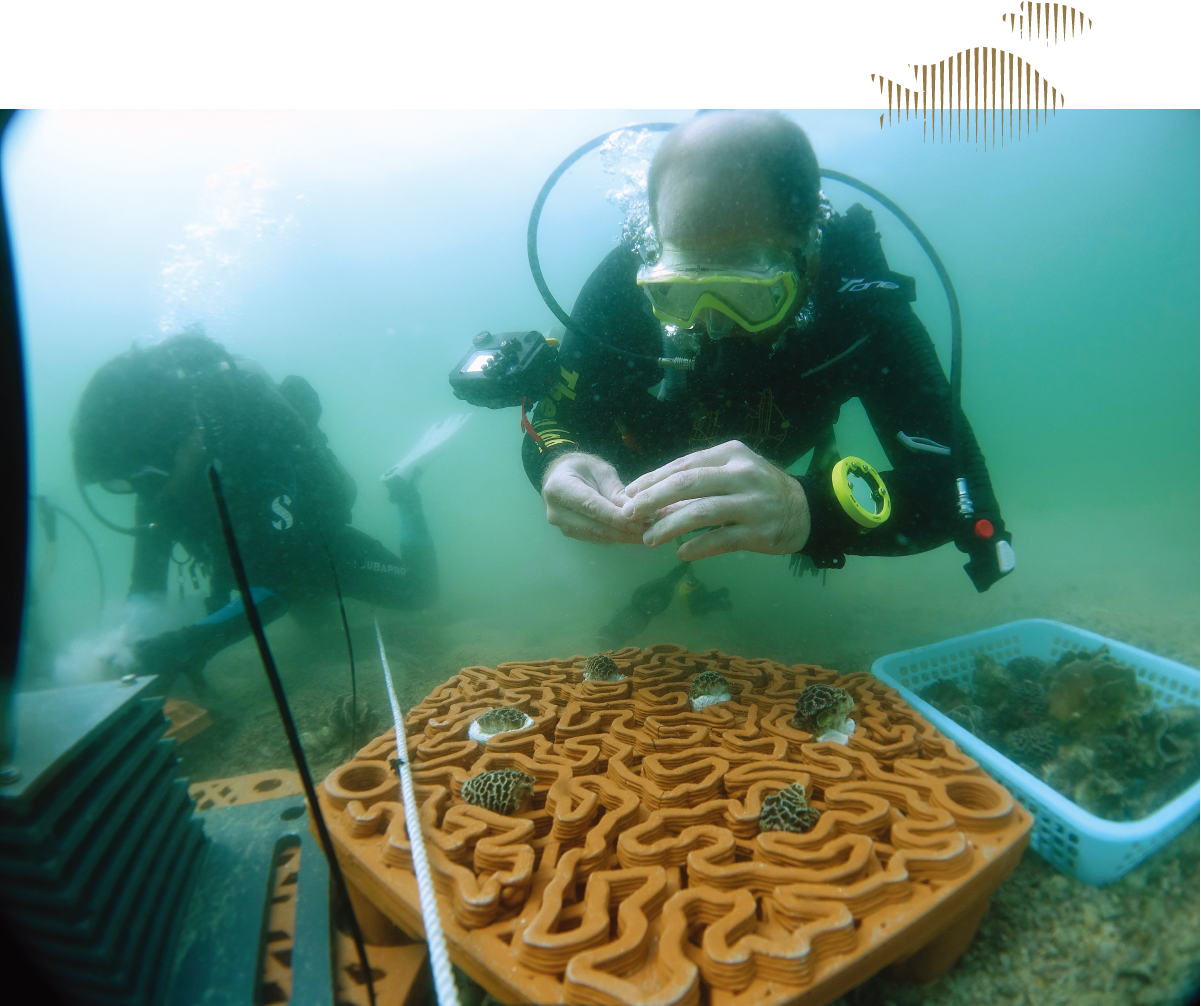
The 3D-printed reef tiles were first
adopted by the Agriculture, Fisheries and Conservation Department (AFCD) of the Hong Kong government as an active management tool to aid coral restoration in Hoi Ha Wan Marine Park.
(Courtesy of AFCD)
Untreated tooth decay among young children is a significant public health problem around the world, including Hong Kong where a government survey found half of five-year-olds had dental caries (cavities) and 75% had never visited a dentist. But now, the Faculty of Dentistry has come up with a solution that is not invasive, unlike drill-and-fill, and that can even be done in a classroom. Their findings have influenced public dental health policies around the world.
Dr Duangporn Duangthip, Senior Clinical Practitioner in Cariology, led the team in applying silver diamine fluoride (SDF) to control tooth decay in preschool children, in a territory-wide kindergarten-based project funded by the Hong Kong Jockey Club Charity Trust.
“Our project enjoyed a very high participation rate and parental satisfaction. Studies by members of the team have shown that SDF is safe, inexpensive and effective in stopping tooth decay. The non-invasive and non-aerosol treatment is also suitable for implementation in a school setting, leading to a new paradigm for management of tooth decay in children,” Dr Duangthip said.
The team also worked with the World Health Organization (WHO) to support the use of SDF. As a result, SDF is now included in the dental section of the WHO’s list of essential dental medicines, which is used as a guide by more than 150 countries. The American Academy of Pediatric Dentistry has also developed a guideline on SDF use for caries management in children based on the research evidence.
Dr Duangthip and her team were awarded the Knowledge Exchange Excellence Award 2021 by HKU.
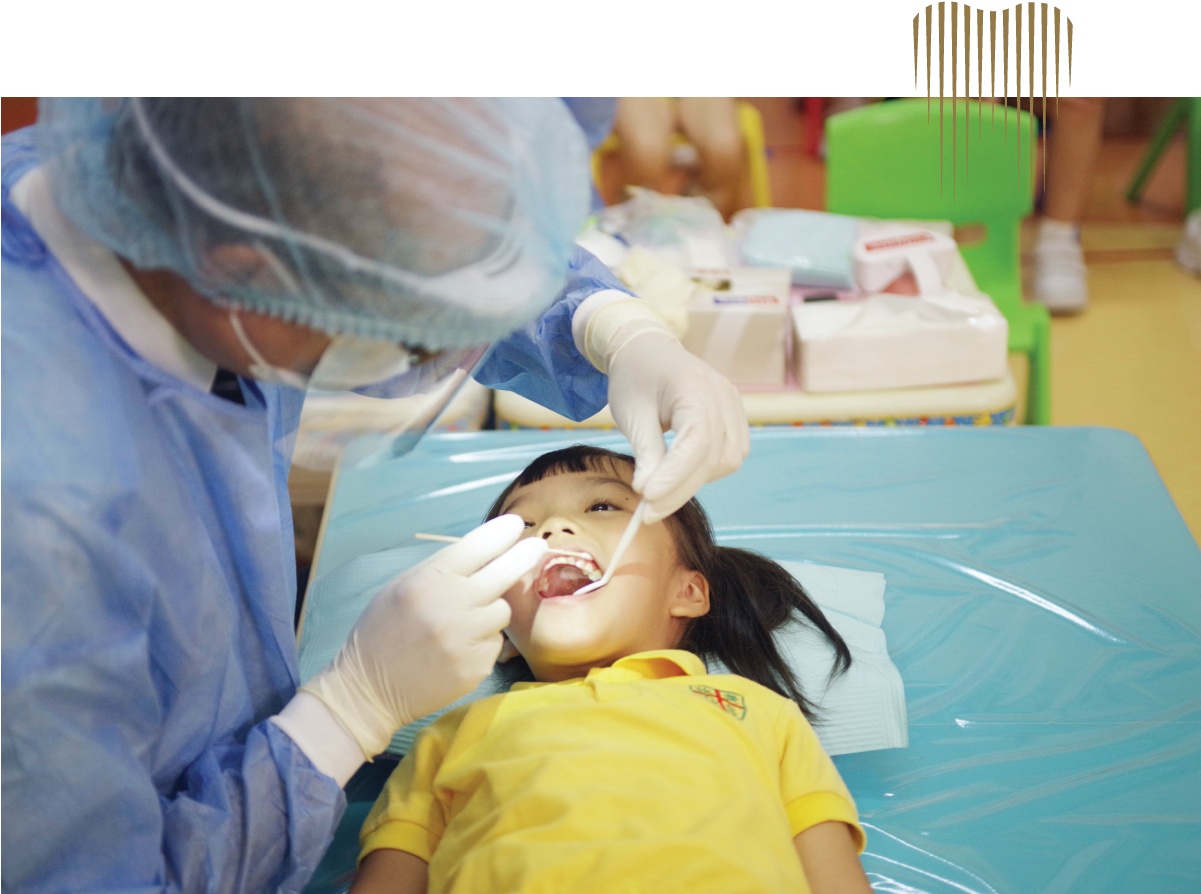
The team has established the territory-wide oral health programme to promote child oral health and manage tooth decay situation in preschool children using silver diamine fluoride (SDF) for caries control.
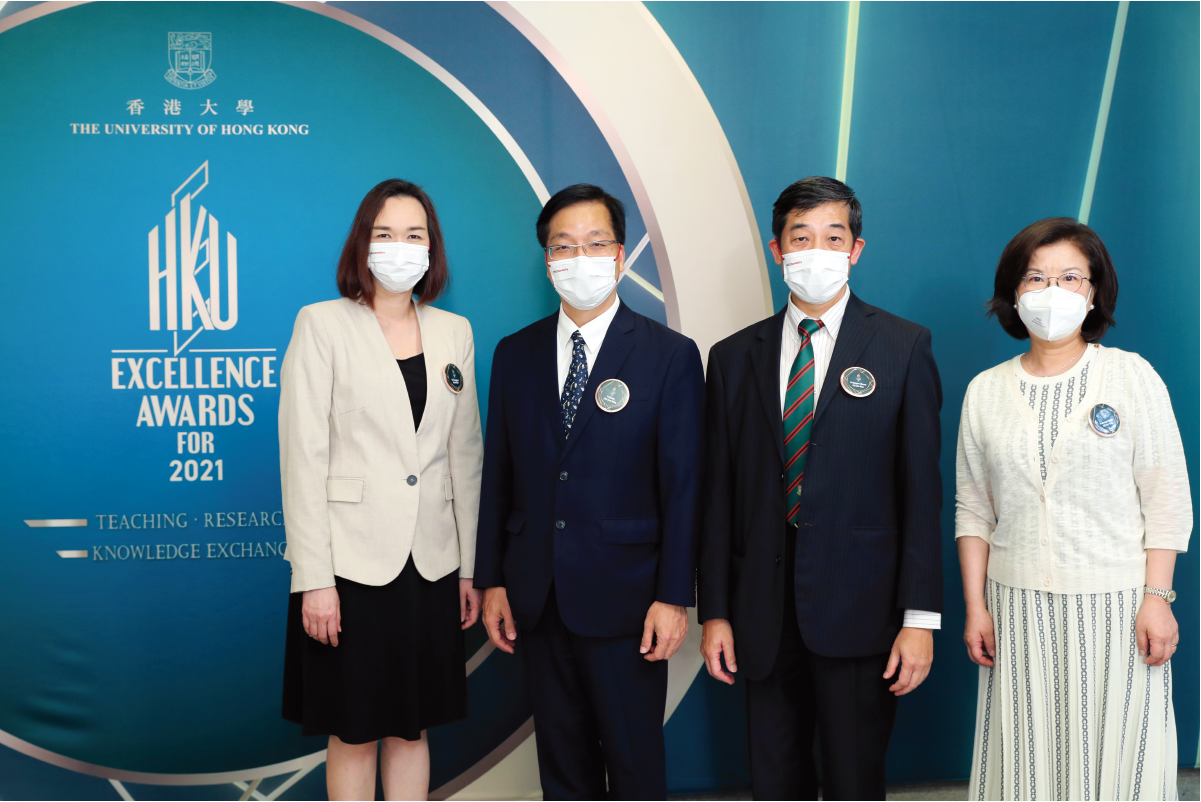
(From left) Dr Duangporn Duangthip, Professor Chu Chun Hung, Professor Edward Lo Chin Man and Professor Cynthia Yiu Kar Yung were honoured with the Knowledge Exchange Excellence Award 2021 for the project ‘Promoting Child Oral Health and Managing Tooth Decay in Preschool Children’.
Access to and competency with digital media has become a critical requirement for daily work, study and life, as the COVID-19 pandemic has underscored. Professor Nancy Law Wai Ying of the Faculty of Education began investigating digital literacy in Hong Kong schoolchildren even before the pandemic started and has produced revealing results about the inequality of digital access and literacy in the city. The results have influenced policymakers and others to take steps to address the gap.
In April 2020 Professor Law released findings from data collected the previous year that showed huge diversities in digital literacy achievement among primary and secondary students within and across schools. This led to the launch of eCitizen Education 360 the following month to guide evidence-based community-wide action to support the learning of students, families, schools and teachers.
The initiative has had wide support from the education sector, NGOs and charities. For example, the Jockey Club and other charities allocated funding to help underprivileged families cope with e-learning, some NGOs introduced new services to provide parents, teachers and school leaders with support in improving children’s digital competence, and schools that were already well-prepared for e-learning shared their experiences with others on multiple platforms.
A follow-up survey in 2021 found that general digital competence had improved across the board, although the competency gap within and across schools had increased, as had the percentage of students reporting serious mental health and internet addiction conditions.
“It is imperative that measures be taken to support schools and teachers in developing appropriate learning environments and activities that will foster digital competence and resilience,” Professor Law said. “Concerted efforts involving community sectors in addition to educators are necessary to address the wellness challenges and the learning divides uncovered through our research.”
Professor Law and her team received the Faculty Knowledge Exchange Award of the Faculty of Education for 2021.
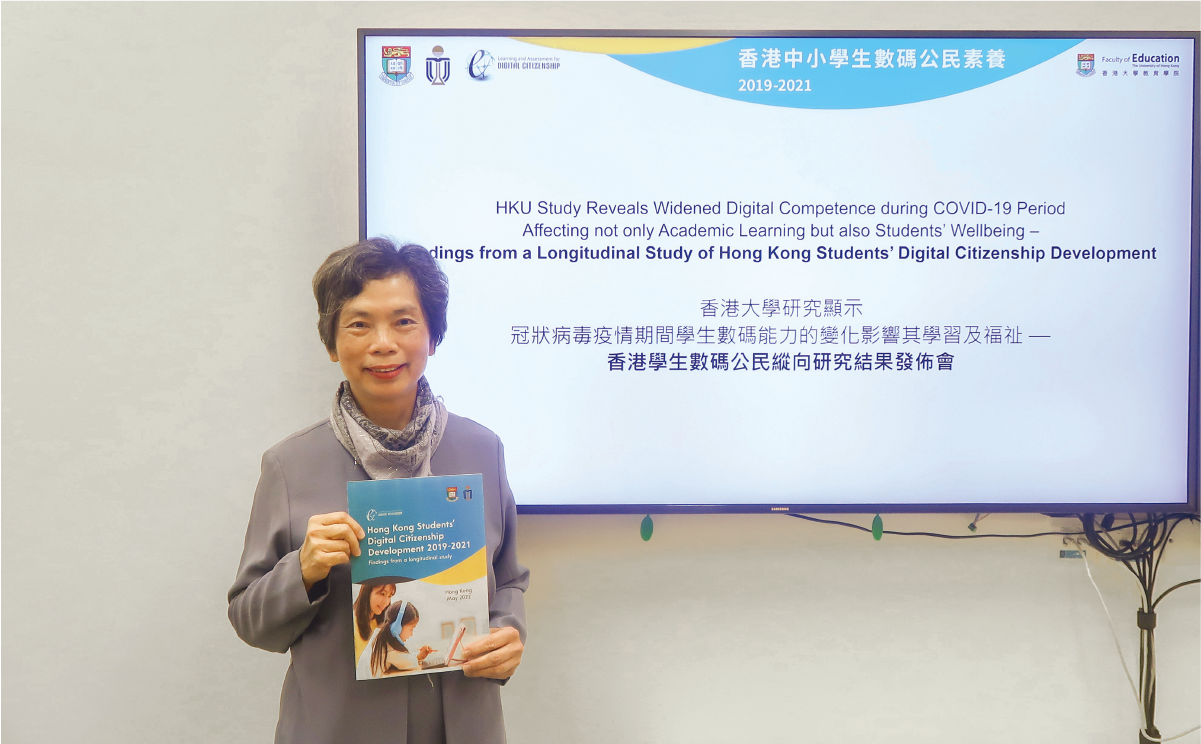
Professor Nancy Law and her team has won the Faculty of Education’s Knowledge Exchange Award 2021 with the project ‘Co-creating a New Normal of Empowered Learning through Digital Citizenship Research’.